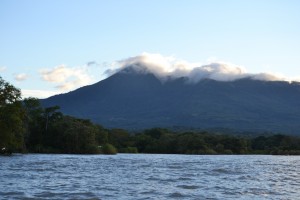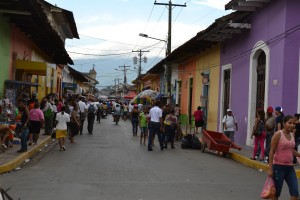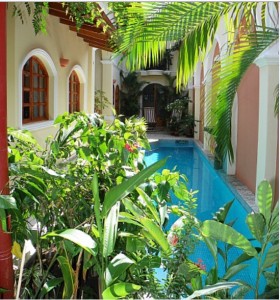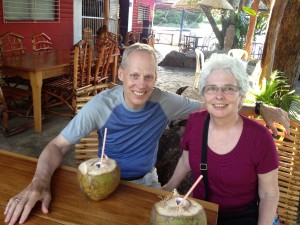So, our Christmas family vacation did not live up to my vision and I grieve for that loss but what about the rest of the trip? What about Granada and our exploration of the possibility of living there?
I Don’t Know
The more I travel, the slower I go. Our trip to Nicaragua was not long enough. Three weeks was just enough time to make assumptions about what I saw but not long enough to understand anything at all.
My preliminary assessment is, Granada is a fine place, but perhaps no finer than many other places.
Steve liked it – of course. He was predisposed to like it because it is hot.
Where as in most places, certainly in Johannesburg, a cloudy day falls short of perfection, in Granada the cloud cover is a relief from the sun. So is walking on the shady side of the street, sitting under an umbrella drinking beer and just staying home by the pool.
 The saving grace is the breeze off Lake Nicaragua. This lake, famous for having fresh water sharks, and being the 9thlargest lake in the world, is a large body of water and the breeze it generates is a blessing.
The saving grace is the breeze off Lake Nicaragua. This lake, famous for having fresh water sharks, and being the 9thlargest lake in the world, is a large body of water and the breeze it generates is a blessing.
Even though I am not a big fan of heat, I did manage to go most of the time without using the AC. Going without AC is important because Nicaragua’s claim to fame for retirees’ is its low cost of living. The lavish use of electricity, an expensive commodity, will cost; cost a lot; cost as much as $200 a month. Or so I am told.
Compared to South Africa, at least my “northern white suburb” experience of South Africa, Nicaragua is an actual third world country. I was prepared for the cost of AC. I had not anticipated the 3rd world frugality that extended to the elimination of hot water. In Granada, water runs weakly and is barely warm. The weather is hot enough to shower two or three times a day, and the lukewarm water is about the right temperature. However, the conservative quantities’ flowing from the shower head left me wondering if my feet had gotten clean.
That may be why swimming pools are considered an almost essential luxury. Houses, at least some houses, are built in the “colonial style”. Where the living area is open air and centers around a pool or garden.
I like the idea of living in the open air. Though I don’t quite understand how useful it is to have a swimming pool in one’s living room.
Here is an example – a very nice example; most places were nowhere near this nice. Imagine a kitchen that is open to this pool area, as is the seating area. The only enclosed rooms are the bedrooms.
Steve fell in love with this place and wanted to move right in. I wouldn’t let him make such an impulsive decision even though the price includes all the furniture.
As for knowing if we, (or should I say “I”, Steve is not plagued by doubts) would be happy living there, the jury is out.
I am told the way to know if you want to move to a place, particularly a place in a foreign country, is you just know and then, apparently, you just commit.
- A real estate agent told us of a woman from Australia who came and within a month purchased a home on a lake outside town.
- A man living in our hotel came for a month and five months later had yet to return home.
- Another man I met came to Nicaragua as a tourist and ended up marrying his (much younger) tour guide.
Clearly many American have come to stay. The town is overrun with Americans: the real estate agent, the home tour guide, the bread baker, the manager of our hotel, the woman sitting next to me at the local Christmas concert, the owner of the restaurant where we ate lunch, the table of men, clearly regulars, sitting all morning at the coffee shop – all American.
There are, I am told, expat Americans doing good works in Nicaragua: teaching children to read, starting small local businesses to create jobs but, in my short visit, I did not see these people.
The retired expats I noticed were the men sitting, drinking rum, at tables in “gringo” restaurants with women far too young and pretty for them. What struck me was the way the men would talk together in English rudely excluding the pretty, young (and probably desperately poor) woman who spoke only Spanish.
That said: the local people were charming. Generally welcoming and apparently without rancor for the way America has treated their country over the years. In 1856 an American mercenary, with a serious ego problem, burnt the town of Granada to the ground. And then, of course, there was Regan and the Contras.
However, despite a relatively long stay, three weeks, we did not see Nicaragua. Because of our crisis we moved around far more than intended and ended up back in Granada where we did far more tourist activities than I would choose. A tourist sees a very different side of a country. Local people, who make their living off tourists, are, by expediency, charming, patience, non political and non judgmental.
If I could speak the language, maybe…
When I express my lack of vision about what our life would be like living in a county where I could not work my business because I don’t speak the language, Steve points out that there are many social, volunteer projects an unemployed American can get involved with: after school programs, establishing libraries, perhaps working with entrepreneurs… if one could speak the language. Clearly, job one would be studying Spanish to the point of competency, which would require at least 12 months, probably more, of focused, daily study. Setting a goal of learning Spanish might be reason enough to spend a year in Nicaragua.
So, for me the jury is out but not for Steve. He is getting more and more eager to quit working, His project is grueling and thankless and shows little hope of improving. He wants to return to Nicaragua for an extended stay by the end of the year.
So 2014 appears to be a year of planning. We will move forward with the assumption that we will be studying Spanish in Nicaragua in 2015 and see what happens in the meantime.




Pingback: Christmas 2013: I’d Have to Be in Active Labor to Stay in a Stable | In My Opinion This is Africa
Well, this is quite a shift from the “stable” post. Larry has been to Nicaragua with Global Exchange and saw many different aspects of the country. You might want to talk with him a bit about his experience, as you consider this as an option. Good luck with your deliberations.
Enjoyed your account!! Sending you and Steve best wishes for your planning and investigations!!